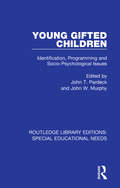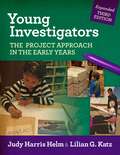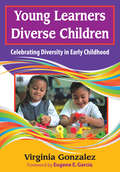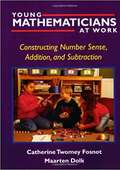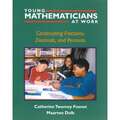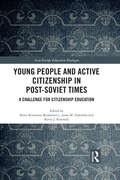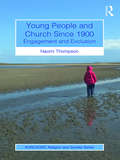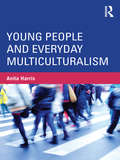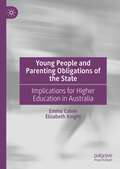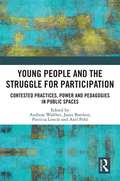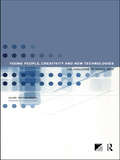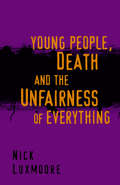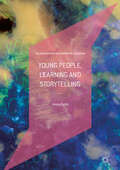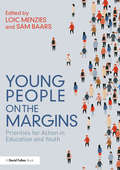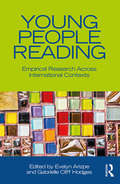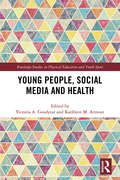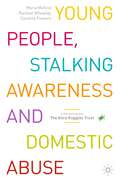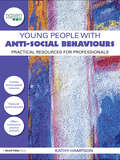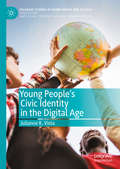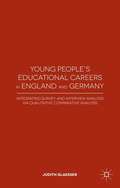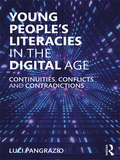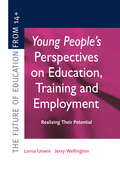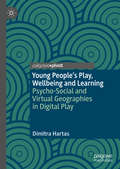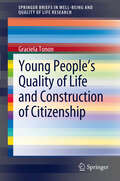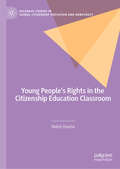- Table View
- List View
Young Gifted Children: Identification, Programming and Socio-Psychological Issues (Routledge Library Editions: Special Educational Needs #41)
by John T. Pardreck John W. MurphyFirst published in 1990. This study on special educational needs explores the identification of the gifted, research on gifted children and programmes, programming for young gifted children, and the socio-psychological implications of giftedness. This title will be of great interest to student teachers, teachers of special educational needs, and parents.
Young Investigators: The Project Approach in the Early Years (Early Childhood Education Ser.)
by Judy Harris Helm Lilian G. KatzNow in its Third Edition, Young Investigators provides an introduction to the project approach with step-by-step guidance for conducting meaningful investigation with young children. The authors have expanded their bestseller to include two new chapters, How Projects Can Connect Children with Nature and Project Investigations as STEM, and to provide more help to teachers of the youngest children (toddlers) and older children (2nd grade). The new edition also shows teachers how to use standards in the topic selection process and identifies activities and experiences that will help children grasp key concepts and skills. Throughout the text, readers listen to teachers' concerns, witness how they find solutions to challenges, and experience how excited children become during project work. This book is appropriate for those new to using the Project Approach, as well as for teachers who already have experience with implementing the Project Approach. <P><P> Book features include: examples of projects from child care centers and preschool, K - 2, and special education classrooms; instructions for incorporating standards and STEM skills into project work; a variety of experiences to help children connect to the natural world; toddler projects that reflect knowledge from recent mind/brain research; tools for integrating required curriculum goals and for assessing achievement; a Teacher Project Planning Journal; and a study guide for pre- and inservice teachers.
Young Learners, Diverse Children: Celebrating Diversity in Early Childhood
by Virginia M. GonzalezNurture young children’s self-esteem and boost learning by integrating family culture with instruction! Emphasizing how connecting instruction with children’s backgrounds increases learners’ confidence and fosters a supportive learning environment, this book helps teachers improve outcomes for diverse and low socioeconomic status (SES) students. Drawing on field-tested methods, the author merges cognition, language, and culture and presents lesson plans, classroom-based alternative assessment tools, and best practices to help readers: Improve literacy through storytelling that reflects students’ lives; Collaborate with parents to increase student achievement; Correlate curriculum with TESOL standards for young children; Integrate academic standards across developmental levels.
Young Mathematicians At Work: Constructing Number Sense, Addition, And Subtraction
by Catherine Twomey Fosnot Maarten DolkIn our efforts to reform mathematics education, we've learned a tremendous amount about young students' strategies and the ways they construct knowledge, without fully understanding how to support such development over time. The Dutch do. So, funded by the NSF and Exxon, Mathematics in the City was begun, a collaborative inservice project that pooled the best thinking from both countries. In Young Mathematicians at Work, Catherine Fosnot and Maarten Dolk reveal what they learned after several years of intensive study in numerous urban classrooms. The first in a three-volume set, Young Mathematicians at Work focuses on young children between the ages of four and eight as they construct a deep understanding of number and the operations of addition and subtraction. Rather than offer unrelated activities, Fosnot and Dolk provide a concerted, unified description of development, with a focus on big ideas, progressive strategies, and emerging models. Drawing from the work of the Dutch mathematician Hans Freudenthal, they define mathematics as "mathematizing" - the activity of structuring, modeling, and interpreting one's "lived world" mathematically. And they describe teachers who use rich problematic situations to promote inquiry, problem solving, and construction, and children who raise and pursue their own mathematical ideas. In contrast to other books on math reform, Young Mathematicians at Work provides a new look at the teaching of computation. It moves beyond the current debate about algorithms to argue for deep number sense and the development of a repertoire of strategies based on landmark numbers and operations. Sample minilessons on the use of the open number line model are provided to show you how to support the development of efficient computation.
Young Mathematicians at Work: Constructing Fractions, Decimals, and Percents
by Catherine Twomey Fosnot Maarten DolkIn our efforts to reform mathematics education, we've learned a tremendous amount about young students' strategies and the ways they construct knowledge, without fully understanding how to support such development over time. The Dutch do. So, funded by the National Science Foundation and ExxonMobil, Mathematics in the City was begun, a collaborative inservice project that pooled the best thinking from both countries. In Young Mathematicians at Work, Catherine Fosnot and Maarten Dolk reveal what they learned after several years of intensive study in numerous urban classrooms. In this third volume in a series of three, Fosnot and Dolk focus on how children in grades 5-8 construct their knowledge of fractions, decimals, and percents. Their book: - describes and illustrates what it means to do and learn mathematics. - contrasts word problems with true problematic situations which support and enhance - investigation and inquiry. - provides strategies to help teachers turn their classrooms into math workshops. - explores the cultural and historical development of fractions, decimals, and their equivalents and the ways in which children develop similar ideas and strategies. - defines and gives examples of modeling, noting the importance of context. - discusses calculation using number sense and the role of algorithms in computation instruction. - describes how to strengthen performance and portfolio assessment. - focuses on teachers as learners by encouraging them to see themselves as mathematicians.
Young People and Active Citizenship in Post-Soviet Times: A Challenge for Citizenship Education (Asia-Europe Education Dialogue)
by Beata Krzywosz-Rynkiewicz Anna M. Zalewska Kerry J. KennedySituated within the context of "post-soviet times", this book explores young people’s citizenship activities and values in three distinct environments: post-soviet union countries, post-soviet union satellites, and countries that were independent of the soviet-union. Its purpose is to investigate the influence of these contexts on the ways young people see their citizenship in what are now emerging democracies. The future of nations depends to a large extent on whether citizens will continue to support existing values and will engage in activities to support those values. Using a framework designed by Kennedy (2006) and further developed by Zalewska, Krzywosz-Rynkiewicz (2011) the study examined the citizenship values of 3794 students aged 11-14-18 from 11 European countries. The main themes of this book include exploring similarities and differences in citizenship activities within countries and across countries; advancing explanations for these similarities and differences; highlighting the importance of contexts that influence citizenship activities and values; and assessing the extent to which democratic values are reflected in young people’s citizenship activities.
Young People and Church Since 1900: Engagement and Exclusion (AHRC/ESRC Religion and Society Series)
by Naomi ThompsonWhen the Sunday School pioneers saw a need in their communities in the late eighteenth century, their response provoked a 200 year movement. These early Sunday Schools met a clear social need: that for basic education. By the 1960s, they faced rapid decline – a rigid institution amidst societal change. Over recent decades, Christian youth work has emerged as a response to further youth decline within churches. Many youth workers engage with young people’s self-perceived needs by delivering open-access youth provision in their local communities alongside more specifically Christian activities. Tensions emerge over whether the youth worker’s role is to serve community or church needs, with churches often emphasising the desire to see young people in services. Drawing together historical and contemporary research, Young People and Church Since 1900 identifies patterns and change in young people’s engagement with organised Christianity across time. Through this, it provides a unique analysis of the engagement and exclusion of young people in three key time periods, 1900–1910, 1955–1972, and the present day. Whilst much commentary on religious decline has focused on changes external to churches, this text draws out the internal decisions and processes that have affected the longevity of Christianity in England. This book will be of interest to researchers and scholars of young people and Christianity in the twentieth century and today, as well as youth ministry students and practitioners and those interested in youth decline in churches more widely.
Young People and Everyday Multiculturalism (Critical Youth Studies)
by Anita HarrisUnlike as with previous generations, diversity and multiculturalism are engrained in the lives of today’s urban youth. Within their culturally diverse urban environments, young people from different backgrounds now routinely encounter one another in their everyday lives and negotiate and contest ways of living together and sharing civic space. What are their strategies for producing, disrupting and living well with difference, how do they create inclusive forms of belonging, and what are the conditions that militate against social cohesion amongst youth? This unique ethnography from education and cultural studies expert Anita Harris explores the ways young people manage conditions of cultural diversity in multicultural cities and suburbs, focusing particularly on how young people in the multicultural cities of Australia experience, define and produce mix, conflict, community and citizenship. This book illuminates rich, local approaches to living with difference from the perspective of a generation uniquely positioned to address this global challenge.
Young People and Parenting Obligations of the State: Implications for Higher Education in Australia
by Emma Colvin Elizabeth KnightThis book explores how the increasing need for specific kinds of parental engagement impacts care-experienced young peoples' trajectories. Previous Australian studies have found that care-experienced young people demonstrate poorer outcomes in health, education, and the criminal justice system throughout their life course. However, this multi-layered case study is the first to specifically address barriers in obtaining higher education—an effective tool for social mobility. In particular, the authors unpack how university marketing relies on young people to have a parent who understands tertiary education transitions to help them navigate post-school pathways to careers or higher education, as well as how policies might fail to help students who do not have such a figure in their lives. The authors offer suggestions for policy change in Australia while providing a basis for global comparisons and recommendations for how care-experienced young people and their support networks can overcome present challenges.
Young People and the Struggle for Participation: Contested Practices, Power and Pedagogies in Public Spaces
by Andreas Walther Janet Batsleer Patricia Loncle Axel PohlYoung People and the Struggle for Participation rethinks dominant concepts and meanings of participation by exploring what young people do in public spaces and what these spaces mean to them, individually and collectively. This book discusses how different spaces and places structure and are in turn structured by young peoples’ activities. Drawing on findings from a comparative study in eight European cities, insights into different styles of youth participation emerging from formal, non-formal and informal settings are presented. The book provides a comparative analysis of how transnational discourses, national welfare states and local youth policies affect youth participation. It also investigates how it comes about that young people get involved in different forms of participation in the course of their biographies. This book will appeal to academics, researchers and post-graduate students in the fields of youth studies, community studies, sociology of education, political science, social work, psychology and anthropology.
Young People, Creativity and New Technologies: The Challenge of Digital Arts
by Julian Sefton-GreenWhat is the creative potential of the new technologies? How can computers create new possibilities for artistic and creative work in education?Young People, Creativity and New Technologies describes ways in which ICTs (Information Communication Technologies) can produce new possibilities for creative work both within the formal curriculum and in complementary educational arenas. It provides a series of case studies which show how 'digital arts' are currently being used across school and community arts curricula and demonstrates how ICTs can be used in a genuinely inter-disciplinary way.It is aimed at those who are interested in practical ways to develop the creative uses of new technologies at school and in community arts settings.
Young People, Death and the Unfairness of Everything
by Nick LuxmooreA taboo subject in today's society, death is something that we do not like to talk about and especially do not like young people talking about. Yet, without opportunities to talk, young people's anxieties about death can manifest themselves in all sorts of self-destructive and socially-destructive ways. In this book, Nick Luxmoore explores the problems that arise when death is not openly discussed with young people and offers invaluable advice about how best to allay concerns without having to pretend that there are easy answers. He covers all of the key issues from the physicality of death to the fear of not existing to the way young people's morality develops and he provides expert insight into the impact these subjects have on young people's behaviour. This book presents a wealth of information for professionals, parents and others working with young people, providing the skills needed to ask young people the difficult question, "Do you think much about death?", and to support them as they begin their answer.
Young People, Learning and Storytelling (Palgrave Studies in Alternative Education)
by Emma ParfittThis book explores the lives of young people through the lens of storytelling. Using extensive qualitative and empirical data from young people’s conversations following storytelling performances in secondary schools in the UK, the author considers the benefits of stories and storytelling for learning and the subsequent emotional, behavioural and social connections to story and other genres of narrative. Storytelling has both global and transnational relevance in education, as it allows individuals to compare their experiences to others: young people learn through discussion that their opinions matter, that they are both similar to and different from their peers. This in turn can facilitate the development of critical thinking skills as well as encouraging social learning, co-operation and cohesion. Drawing upon folklore and literary studies as well as sociology, philosophy, youth studies and theatre, this volume explores how storytelling can shape the lives of young people through storytelling projects. This reflective and creative volume will appeal to students and scholars of storytelling, youth studies and folklore.
Young People on the Margins: Priorities for Action in Education and Youth
by Loic Menzies Sam BaarsOur society leaves too many young people behind. More often than not, these are the most vulnerable young people, and it is through no fault of their own. Building a fair society and an equitable education system rests on bringing in and supporting them. By drawing together more than a decade of studies by the UK’s Centre for Education and Youth, this book provides a new way of understanding the many ways young people in England are pushed to the margins of the education system, and in turn, society. Each contributor shares the personal stories of the young people they have encountered over the course of their fieldwork and practice, combining this with accessible syntheses of previous studies, alongside extensive analysis of national datasets and key publications. By unpicking the many overlapping factors that contribute to different groups’ vulnerability, the book demonstrates the need to understand each young person’s life story and to respond quickly and collaboratively to the challenges they face. The chapters conclude with action points highlighting the steps individuals, institutions and policy makers can take to bring young people in from the margins. Young People on the Margins showcases first-hand examples of where these young people's needs are being addressed and trends bucked, drawing out what can and must be learned, for teachers, leaders, youth workers and policy makers.
Young People Reading: Empirical Research Across International Contexts
by Evelyn Arizpe Gabrielle Cliff HodgesThe value of small-scale qualitative research projects into young people’s reading is often underestimated. Yet these finely tuned studies, with a precise focus and highly specialised approach, can provide us with profound insights into the richness and variety of young people’s reading practices. Bringing together contributors from six continents, this fascinating volume explores researchers’ experiences of investigating the reading habits, preferences and practices of young people aged 12–21. Detailing a variety of empirical methodologies and research methods, its chapters also consider reading in an array of contexts, in various languages and using diverse media. Key issues addressed in the book include: the complexity of sociocultural similarities and differences in young people’s reading in international contexts multilingual, bilingual and monolingual readers’ experiences of reading how young readers use a range of different print and digital media how our understanding of the range of texts available to young readers and the different contexts of and purposes for reading can be enhanced through small-scale qualitative research. Providing in-depth discussion of contributors’ research and findings, and touching on many different contexts, text types and media, this volume will support and inspire current and future researchers, lecturers and teachers interested in young people’s reading.
Young People, Social Media and Health (Routledge Studies in Physical Education and Youth Sport)
by Victoria Goodyear Kathleen ArmourThe Open Access version of this book, available at http://www.tandfebooks.com/doi/view/10.4324/9781351026987, has been made available under a Creative Commons Attribution-Non Commercial-No Derivatives 4.0 license The pervasiveness of social media in young people’s lives is widely acknowledged, yet there is little evidence-based understanding of the impacts of social media on young people’s health and wellbeing. Young People, Social Media and Health draws on novel research to understand, explain, and illustrate young people’s experiences of engagement with health-related social media; as well as the impacts they report on their health, wellbeing, and physical activity. Using empirical case studies, digital representations, and evidence from multi-sector and interdisciplinary stakeholders and academics, this volume identifies the opportunities and risk-related impacts of social media. Offering new theoretical insights and practical guidelines for educators, practitioners, parents/guardians, and policy makers; Young People, Social Media and Health will also appeal to students and researchers interested in fields such as Sociology of Sport, Youth Sports Development, Secondary Physical Education, and Media Effects.
Young People, Stalking Awareness and Domestic Abuse
by Maria Mellins Rachael Wheatley Caroline FlowersThis book addresses domestic abuse and stalking among young people in the UK and Ireland, with a focus on intersectionality and lifestyle settings. In partnership with the Alice Ruggles Trust, this book draws on a wealth of expert contributions including those with lived experience, frontline services such as Paladin National Stalking Advocacy Service, charities EmilyTest and Hollie Gazzard Trust, researchers of so-called honour-based abuse and online harms, and forensic psychologists who work with people who stalk. It begins with an overview of ways to recognise harmful behaviours, including those carried out online. The discussion then moves on to methods and motivations of stalking and coercive control and the various lifestyle contexts including education environments, young people in the workplace, and the role of the police and frontline support services in tackling these issues. It is a vital resource for undergraduate students across criminology, sociology, law, psychology, education, social justice, policing, and forensic psychology, as well as a combination of academic researchers and professionals working within stalking and domestic abuse support and prevention. This action-orientated book also includes 'Key Points' and ‘Discussion Questions’ in each chapter to direct student learning in the classroom and to create discussion points for wider readers.
Young People with Anti-Social Behaviours: Practical Resources for Professionals (nasen spotlight)
by Kathy HampsonThe media today suggests that many young people are becoming involved in anti-social behaviour. But increasing amounts of legislation and ASBOs neither seem to have addressed the real issues nor solved the problem, and may simply add to the frustrations of all those involved. Kathy Hampson’s comprehensive guide is based on up-to-date, grass-roots experience of working with young people with anti-social behaviour. Including ready-to-use, photocopiable resources suitable for a wide variety of settings, it examines the background to these highly topical issues, enabling the reader to contextualise and better identify with the problems faced by the young people they work with. The easy-to-reproduce, tried-and-tested exercises: are for use with individuals or groups address the issues involved in offending behaviour can be easily modified to cater for a range of learning styles, abilities and maturity, (and shows how you can identify which exercises suit which young people) include discussion scenarios, worksheets, cartoons, card games and creative activities can be used to dissuade young people from getting involved in anti-social behaviour, and to enable them to make better decisions The book includes an appraisal of current research on the issues surrounding anti-social behaviour and, in particular, risk factors that may be involved ‘behind the scenes’ in young people’s lives. A section on working with parents helps them to support their children, improve their parenting skills and to know where, and how, to ask for help. This is an essential resource offering constructive, practical solutions to anti-social behaviour in young people between the ages of 10 and 18. It will be invaluable for those working professionally or voluntarily in schools, with youth groups, youth offending teams, youth inclusion projects, faith groups, anti-social behaviour teams, or for anyone whose work offers the opportunity, or requires them, to challenge anti-social and offending behaviour.
Young People's Civic Identity in the Digital Age (Palgrave Studies in Young People and Politics)
by Julianne K. ViolaThis book explores young people’s civic experiences in contemporary American society, and how they navigate the political world in an era defined by digital media. Drawing on the experiences of young people before they have reached voting age, the book provides vital perspectives on citizenship and civic engagement of a part of the population that is often overlooked. The author engages with the tensions young people encounter in their everyday personal and civic lives, particularly in their understanding and experience of civic identity in ways that are shaped by society’s (mis)perceptions of youth. The book introduces a new framework of civic identity that has been directly informed by the lived civic experiences of young people themselves. The findings will be of great interest to researchers and students working in political science, sociology, youth studies, education studies, and media studies, as well as policy-makers, practitioners, and parents of young people.
Young People’s Educational Careers in England and Germany
by Judith GlaesserThrough a comparative study of young people's educational careers in England and Germany, this book explores the range of influences which shape educational careers such as the individual talents and interests of young people, their social class and background, as well as school and country characteristics. Methodologically, the book develops a mixed methods approach that utilises Charles Ragin's increasingly popular Qualitative Comparative Analysis (QCA) to examine cross-case analyses of secondary survey data alongside within-case process-tracing analyses of interview data to establish causal understanding of educational careers. International comparison adds another dimension, exploiting the significant differences between the two countries' school and university systems. The book therefore offers both a contemporary account of young people's educational careers and decision-making as well as a practical contribution to ongoing debates concerning the establishment of causal andexplanatory knowledge in the non-experimental social sciences.
Young People's Literacies in the Digital Age: Continuities, Conflicts and Contradictions
by Luci PangrazioWhat do young people really do with digital media? Young People's Literacies in the Digital Age aims to debunk the common myths and assumptions that are associated with young people's relationship with digital media. In contrast to widespread notions of the empowered and enabled 'digital native', the book presents a more complex picture of young people's digital lives. Focusing on the notion of 'critical digital literacies' this book tackles a number of pressing questions that are often ignored in media hype and political panics over young people’s digital media use, including: In what ways can digital media enhance, shape or constrain identity representation and communication? How do digital experiences map onto young people’s everyday lives? What are young people’s critical understandings of digital media and how did they develop these? What are the dominant understandings young people have of digital media and in whose interests do they work? These questions are addressed through the findings of a year of fieldwork with groups of young people aged 14 to 19 years. Over the course of eight chapters, the experiences and views of these young people are explored with reference to various academic literatures, such as digital literacies, media and communication studies, critical theory and youth studies. Starting with their early socialisation into the digital context, the book traces the continuities, contradictions and conflicts they encounter as part of their practices. Written in a detailed but accessible manner, this book develops a unique perspective on young people’s digital lives.
Young People's Perspectives on Education, Training and Employment: Realising Their Potential (Future Of Education From 14+ Ser.)
by Jerry Wellington Lorna UnwinBased on interviews with over 150 young people in education and training, this volume reflects on their perspectives on the issues and challenges that education and training have to offer.
Young People's Play, Wellbeing and Learning: Psycho-Social and Virtual Geographies in Digital Play
by Dimitra HartasThis book explores the shifting geographies and contexts of children's play and learning. The author examines both free and guided play through the lenses of class, gender and disability, drawing links between face-to-face and online interactions. As young people increasingly spend time in virtual environments it is important to adjust understandings of how, and when, they engage with learning. The book examines play as a continuum of activities and peer interactions, interrogating what it takes to bridge the gap between academic and wellbeing goals for children with disabilities and disadvantage, as well as those at the intersection with other markers of difference (e.g. gender and race). It will be of interest and value to scholars of play and education, as well as those working with disabled or disadvantaged children.
Young People's Quality of Life and Construction of Citizenship
by Graciela TononThe study of quality of life refers to the material environment (social welfare) and psychosocial environment (wellbeing). It has been defined as a concept that implies the objective and subjective dimension that Cummins (1997) first studied in seven domains. The use of domains in the quality of life study allows a more precise measurement than the one that could have been reached through simple questions, since psychometric scales are used and if the addition of domains is equivalent to the totality of life satisfaction, then the group of domains is a valid measure of quality of life. In the case of young people, it has been observed that even if they live in negative physical, social and contextual conditions, they can nevertheless experience a relatively positive experience in relation to their quality of life, depending on the strategies and capabilities that they generate in relation to the context. Similarly, young people that live in favorable socioeconomic conditions and with a trouble free psychological situation may experience a relatively poor evaluation of their position in life (Patrick et al). oung people do not form a homogenous group and, in this sense, it is not possible to generalize about youth; they interact with the environment in which they live and they are a product of the history they happen to live, in this way they transit different vital scenarios in daily life that affect their quality of life. The social representations about youth that each population has, in each historical moment, are embedded in the social context in which young people live and develop, conditioning every-day life and /or creating related stereotypes. The concept of youth is a social construction built conjointly by all members of society in the historical moment in which they live. Young people interact with the environment in which they live and they are a product of the history they happen to live. Authors like Urresti (1999) define youth from a point of view that takes into account the living together of different generations in different societies, thus being impossible to compare young people of today with those of two or three decades ago; in addition, he states that it is necessary to situate the understanding of youth within the historical and social moment in which they live. Nowadays the predominant adult model is based in individualism, and even if an intergenerational dialogue is necessary, it is difficult for young people to achieve this kind of communication with adults that, in some cases, are living "stages of youth" or that need to be "forever young". Young people live in uncertainty, with a limited perspective for future action, assigning their own meaning to events and facts, according to their fundamental concerns that are significantly different from those of their parents' generation. In the other side the process of globalization and the protagonist social role of the new informational and communicational technologies, produce that the possibilities to expand individual freedoms increase, but not all young people can manage with it (Lechner, 2002). What young people need in order to construct their citizenship and feel satisfied, varies according to the different societies, especially considering that most of them live a fragile situation. As Cortina (2003:7-9) states, the idea of citizenship always transcends individualism, because the citizen is somebody that exists together with others, and those others are equal to him before the city, is somebody that deliberates with others, that acts with others conjointly, that assumes the protagonist role of his own life, in this way citizen is not only that who the law protects, but that who participates in the public issues. Speaking about young people we propose to recognize them from their equal dignity because "recognition is not only a courtesy that we owe others: it is an essential human need" (Taylor, 1993:46). This recognition is based in human dignity and tends to protect the basic rights of people as individuals and to recognize the particul...
Young People's Rights in the Citizenship Education Classroom (Palgrave Studies in Global Citizenship Education and Democracy)
by Helen HannaThis book explores the rights held by young people in the citizenship education classroom in the divided societies of Northern Ireland and Israel. Against the backdrop of a long history of protracted conflict and division, the author analyses how international rights obligations are reflected in the contested citizenship education curriculum in secondary schools. Drawing upon extensive qualitative data as well as policy and curriculum documents, the author reveals that understandings of education rights can be oriented around three themes – minority group representation in the curriculum, dealing with difference through pedagogy, and preparing young people for life in a (divided) society. This can be mapped onto the 42-A rights framework where education should be ‘acceptable’ and ‘adaptable’. However, the variety of interpretations held by participants raises questions regarding the ‘universality’ of international frameworks for education rights, and the workability of such frameworks in the national and divided contexts. While the contexts of Northern Ireland and Israel have much in common, they are rarely compared: this book will show that their comparison is as relevant as ever, as issues of identity continue to affect everyday school life. This book will be of interest to citizenship and history education scholars, as well as those who are concerned with the application of international human rights law.
